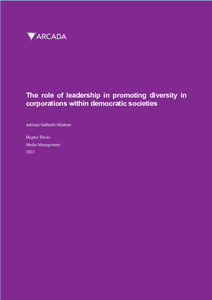The role of leadership in promoting diversity in corporations within democratic societies
Galbiatti Minhoto, Adriana (2023)
Galbiatti Minhoto, Adriana
2023
All rights reserved. This publication is copyrighted. You may download, display and print it for Your own personal use. Commercial use is prohibited.
Julkaisun pysyvä osoite on
https://urn.fi/URN:NBN:fi:amk-2023112731799
https://urn.fi/URN:NBN:fi:amk-2023112731799
Tiivistelmä
In a context where more and more people have to invest in the development of skills to adapt and be able to fulfill the constant demands of companies, this thesis aims to study the role of a good leader in promoting diversity and equality within corporations.
By embracing diversity and promoting inclusion, organizations can foster innovation, creativity, and collaboration, leading to a more successful and sustainable future. Leaders must become aware of their power and its limits by asking themselves - what can I do from my position to promote necessary changes to the status quo?
Understanding the concept of diversity not only as age, gender, race, and culture, among others, but also as educational background, geographic location, and religious beliefs, leaders with this insight into diversity have multiple perspectives, which enable them to explore social and cultural contexts within the company and engage with the challenges.
Cultural experiences and values of leaders shaped by societal as well as organizational contexts influence how leaders bring diversity in their leadership, how the leaders perceive behaviors, and how they exercise their own leadership.
Addressing key concepts such as types of leadership and their role, diversity, culture, intersectionality, diversity management, and workforce diversity in a literature review and qualitative research, the greatest contribution of this thesis is the identification of skills that enhance good leadership by promoting values of diversity, cultural and social inclusion, and anti-discriminatory attitudes.
By embracing diversity and promoting inclusion, organizations can foster innovation, creativity, and collaboration, leading to a more successful and sustainable future. Leaders must become aware of their power and its limits by asking themselves - what can I do from my position to promote necessary changes to the status quo?
Understanding the concept of diversity not only as age, gender, race, and culture, among others, but also as educational background, geographic location, and religious beliefs, leaders with this insight into diversity have multiple perspectives, which enable them to explore social and cultural contexts within the company and engage with the challenges.
Cultural experiences and values of leaders shaped by societal as well as organizational contexts influence how leaders bring diversity in their leadership, how the leaders perceive behaviors, and how they exercise their own leadership.
Addressing key concepts such as types of leadership and their role, diversity, culture, intersectionality, diversity management, and workforce diversity in a literature review and qualitative research, the greatest contribution of this thesis is the identification of skills that enhance good leadership by promoting values of diversity, cultural and social inclusion, and anti-discriminatory attitudes.
